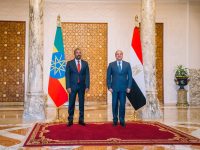The United Nations Security Council held a special session to discuss the situation in Libya,…

Dr Congo, push in Kinshasa: the day after
Kinshasa, calm returned this morning, Monday 20 May. “The army has perfect control of the situation,” said the government spokesperson.
It is among the safest streets of the Congolese capital, in the La Gombe district, where there are institutional headquarters and several residences of Congolese officials and ambassadors, that the attack occurred around 4.30 on Sunday morning.
While uncertainty remains about the objectives of the 50-man commando led by Christian Malenga, (in circumstances that still remain unclear, the attackers were then “neutralized” neutralized) these events weaken a power already under tension due to a war in east of its territory and strong political uncertainties.
Tina Salama, spokeswoman for President Felix Tshisekedi, confirmed that the presidential palace itself had been attacked on Sunday morning, but the army had immediately regained control.
The leader of the attackers, Christian Malanga, was an activist who was “a bit of a dreamer but very determined”, according to a Congolese politician who recently met him.
Born on January 2, 1983, Christian Malanga was very active on social media, popular for his videos hostile to the regime of President Félix Tshisekedi.
A former military officer, he became a businessman and entered politics in the Democratic Republic of Congo during the 2011 elections by running for parliament, but was arrested two days before the vote.
In 2017, he creates a government in exile in Brussels, called New Zaire, with which he wants to return sovereignty to the Congolese people.
Immediately afterwards he founded a political party called the United Congolese Party, without roots or weight, a small party that aimed to network in the Congolese diaspora around the world and which over time ended up gaining a certain popularity among native Congolese abroad; at the head of which he had aspired since 2015 to overthrow the Congolese regime, first of Joseph Kabila, then of Félix Tshisekedi.
His profile and the dynamics of the attempted coup leave many shadows – according to the French newspaper Le Monde – due to the possible complicity that the commando could have benefited from and the real objectives.
On his website and on his Facebook profile Malanga had claimed that it was the period spent in the Congolese army that turned him against the government of Kinshasa, denouncing its corruption and the lack of interest shown in the interests of its citizens by the government of Félix Tshisekedi
According to what was reported by the British newspaper “Daily Mail”, Malanga also involved Benjamin Zalman-Polun, 36, a resident of Maryland and business partner of Malanga in the United States for mineral resources and in the DRC, in the attempt on him.
The number two of the group, resident in California, would be Cole Patrick, with whom Malanga and Zalman-Polun opened a mining company in Mozambique in 2022.
Since coming to power in early 2019 – and re-elected with 73% of the vote five months ago – this is not the first time Felix Tshisekedi has been the target of destabilization, but Sunday’s attack is by far the most more serious event. This happened in fact while the eastern part of the DRC was once again in the grip of war and when it took more than three months for the appointment of Vital Kamerhe: a politician from the DRC who is also head of the Ministry of Economy as well as a presidential candidate of the National Assembly.
While the government of Félix Tshisekedi is confirmed, it is resorting to various mercenary organizations to ensure control of the country, Congo continues to be afflicted by profound political instability, endemic corruption and armed conflicts in the eastern regions. And many of the dissatisfied also belong to the armed forces




